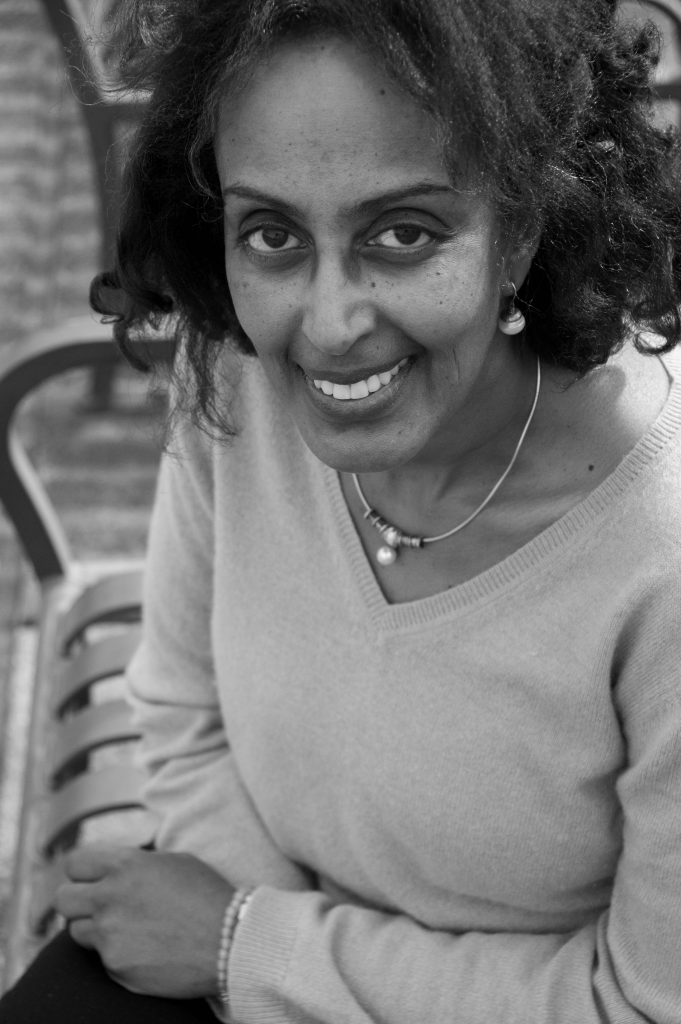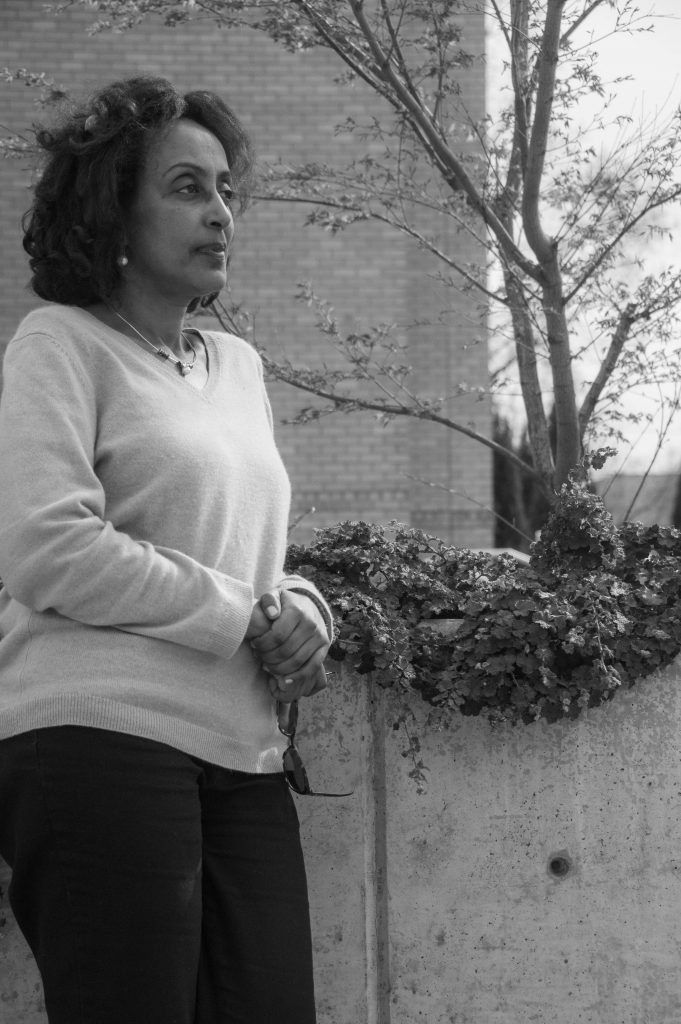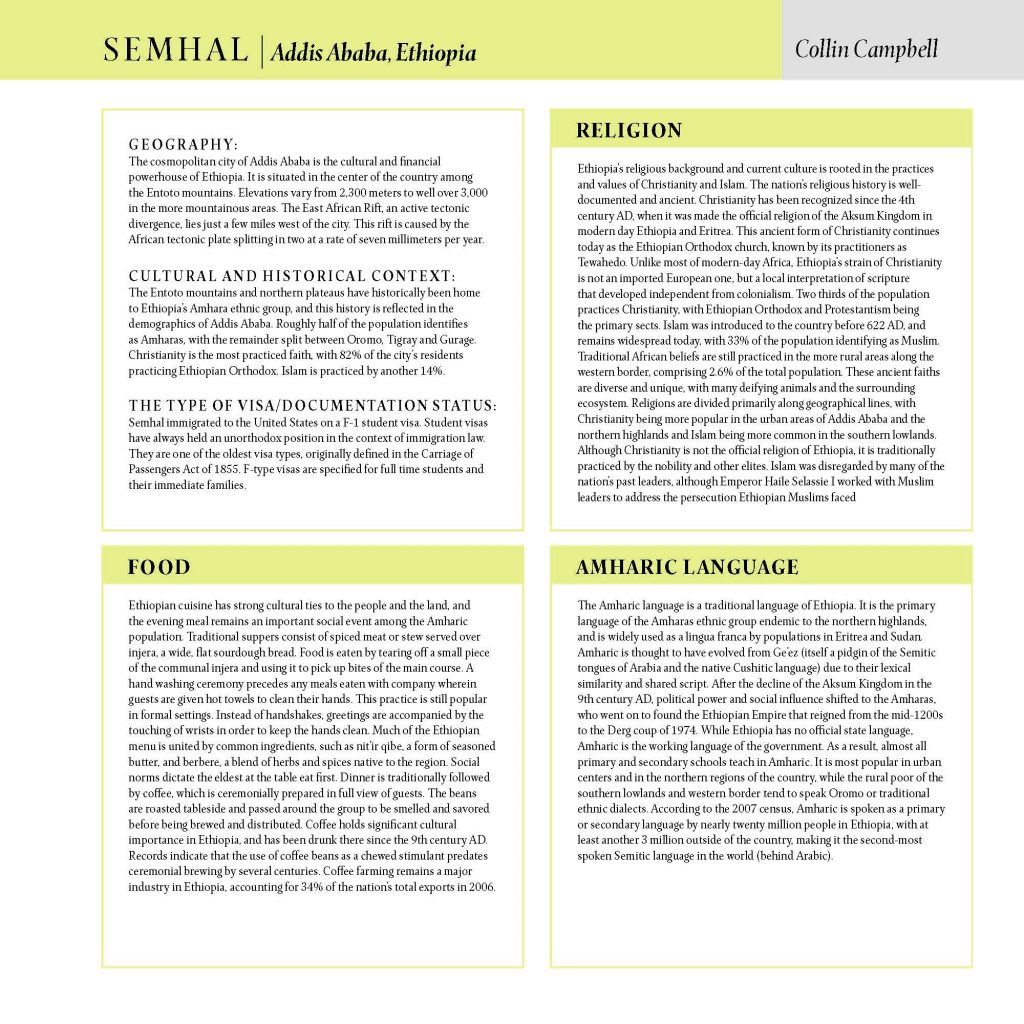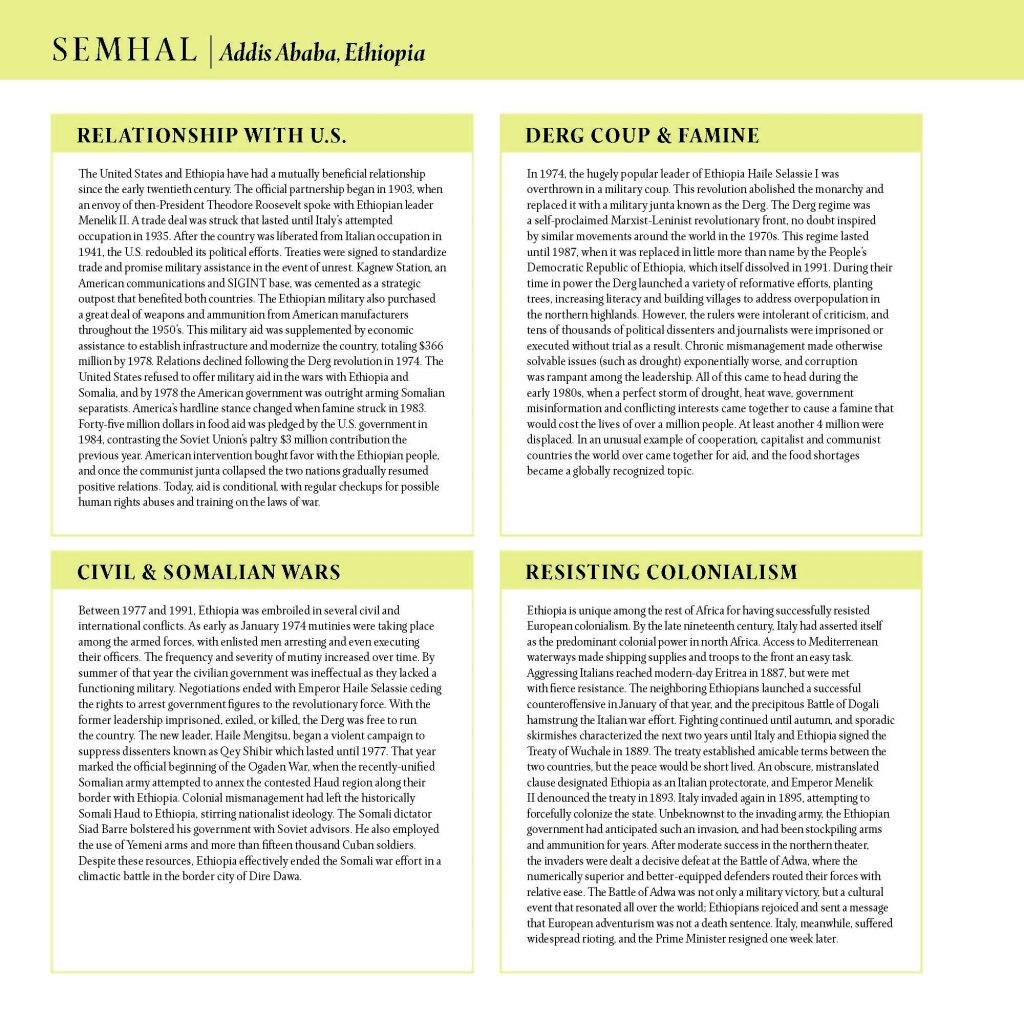 I grew up in Addis Ababa, Ethiopia speaking Amharic, and because my family are from the northern part, mainly Tigray and Eritrea, I also speak Tigrinya. Growing up in Ethiopia was very nice. Ethiopia is very family-oriented, and I had plenty of opportunity to play with my cousins and friends, bond with my aunts, uncles and neighbors. I went to the same school from primary school all the way to high school. Most of my friends did the same so it gave us the opportunity to grow up together from age three up to eighteen and I still keep in touch with most of my childhood school-mates.
I grew up in Addis Ababa, Ethiopia speaking Amharic, and because my family are from the northern part, mainly Tigray and Eritrea, I also speak Tigrinya. Growing up in Ethiopia was very nice. Ethiopia is very family-oriented, and I had plenty of opportunity to play with my cousins and friends, bond with my aunts, uncles and neighbors. I went to the same school from primary school all the way to high school. Most of my friends did the same so it gave us the opportunity to grow up together from age three up to eighteen and I still keep in touch with most of my childhood school-mates.
In 1974 there was a revolution. Emperor Haile Selassie was overthrown and Ethiopia became a communist country. The new government was very strict and there was no freedom. It was a time of political unrest and protests, and a lot of the youth and university students were put to prison or got killed. All who were Emperor Haile Selassie’s aides, family members, and associates were imprisoned or put to death. Both my parents were educated. Because it was communism, salaries were frozen, no one made much money. My father was an electrical engineer and was educated in the United States. My mom was a nurse. They both were professionals and could comparatively managed to make ends meet at a time when no one could earn much regardless of their skill or their education.
When I grew up, Addis Ababa was the main developed city. We did have a lot of family from my mom’s side. On my father’s side, most lived in Tigray and Eritrea. My Eritrean cousins aged twelve through seventeen left home very early and fought in the war against Ethiopia. When war ended and Eritrea became an independent country around 1991-92, it was then that my aunt discovered that out of her three sons, only one has survived. She didn’t know that they had died a decade ago, until the war was over. News never traveled fast, it was hard to communicate during those days. Telephone service was really scarce and outside Addis Ababa the service was harder to get. We might talk on the phone once or twice a year with our family who lived outside the city. Not everyone had a phone at home, it was common to go to the telephone company to place phone calls.
When the revolution broke, I remember that I was in third grade. We would be at school and there were rocks being thrown, windows breaking and we would be hiding under the tables. The city was full of protests and the military government that overthrew Haile Selassie, would shoot unarmed protestors. It was very common to see dead bodies on the streets. There was a period of time, we did not go to school and had to stay home because it was not safe. Between third through seventh grade we would always hear shooting outside. We would be scared. We would all worry wondering who got killed, could it be any of our parents or family members. A lot of my classmates have lost their older siblings to the shooting of the military government. University students and youth who protested, if not killed would be imprisoned and tortured. This was very bad, scary time.
By the time I finished high school, the wars with Eritrea and Somalia were still going on. The young like me who just finished high school were forced to enlist. The next thing was to be sent to the military. That was the main reason I came to the United States. It is not like here where you get trained and eventually go to war, it is actually in one week you were sent to an actual war. The choice would have been to go to war or flee the country. Everybody, men and women, unless one was permanently sick or experiencing disability, there was no choice, we all had to go.
My parents were not political in any way. Once Haile Selassie’s regime was thrown out it was never safe in any way to say what your political stance was. Freedom is not like here where you have the freedom of speech. I never heard of freedom of speech so I never really questioned it. My parents wanted to be safe and get home by the end of the day, so they just went along with life and complied with the military government. Everyone learned to stay clear and observed the eight pm curfew. We were called every weekend for a class to learn about communism, or to serve the community by activities such as tree planting. During my middle and high school years, spent a lot of time on weekends on political brainwashing sessions. All the youth would be called to gather and many hours of the evenings and weekends were spent learning the teachings of communism.
After the revolution everything was nationalized. There was no more private ownership of businesses or farms. Everything got very scarce. We had to wait in line for hours to buy things like sugar, flour, bread and oil. We couldn’t just go to the store and buy things. It would be announced what items were available for sale and we rushed to get it before it was all gone. Ethiopia was very agricultural when I grew up and preparation of food was very labor intensive. We would first buy the wheat, take it to the mill, get it made into flour and then bring it home and knead it and bake it to make bread.
After the revolution many things were scarce. People never could strive or improve on their personal life. Everything was still scarce and everything was hard. There was not enough gas for cars so people were careful and would only drive for important reasons so that they do not run out of gas unnecessarily. There was no, “Let’s drive around for fun.” People had to be mindful of every little expenditure.
 I came to the United States when I was nineteen, about a year after high school. I had an aunt in California, who helped my sister and me not end up being sent to war, and she asked someone at her church if we could come stay with them. We didn’t expect them to say yes, but they kindly agreed to help us. My sister came first and then I followed a year later. This was in the 1980s. I went to a community college and took classes. My interest was in the sciences rather than in language or writing and I eventually earned a bachelor of science in environmental science. My sister also completed her degree in nursing. When she got a job I was able to transfer to a four-year college and she helped pay most of my tuition for me. I went to Cañada Community College and transferred to the University of San Francisco to finish up.
I came to the United States when I was nineteen, about a year after high school. I had an aunt in California, who helped my sister and me not end up being sent to war, and she asked someone at her church if we could come stay with them. We didn’t expect them to say yes, but they kindly agreed to help us. My sister came first and then I followed a year later. This was in the 1980s. I went to a community college and took classes. My interest was in the sciences rather than in language or writing and I eventually earned a bachelor of science in environmental science. My sister also completed her degree in nursing. When she got a job I was able to transfer to a four-year college and she helped pay most of my tuition for me. I went to Cañada Community College and transferred to the University of San Francisco to finish up.
I learned English in Ethiopia. It is common to learn English or French in Africa as a foreign language besides the local languages. In high school the curriculum was in English. The English classes mainly taught grammar and not much communication. For communication we had our own language, Amharic, so we never really used English. We also learned Amharic as a subject. Just like English classes in the US, an Amharic class taught us poetry, literature and debate. When I came to the US even though I thought I knew English, I found English to be very hard to understand. Hearing English language continuously and having to comprehend and speak back was a totally different thing than how I experienced it growing up.
A lot of Ethiopians walked through the desert land and crossed to the Sudan, Djibouti or Kenya to escape the Ethiopian wars with its neighboring countries and flee from military service and ended up in refugee camps before they could apply for visa and eventually migrate to Europe or the United States. I am very thankful for the family who sponsored my sister and me so that we could come to the US.
Ethiopian Orthodox religion is a big part of our culture. It is practiced as an everyday way of life. People fast on Wednesdays and Fridays. It is very common for most people to go to church on Sundays. During the hard times, our religion was what helped sustain us to carry on. Christianity and Islam (Ethiopia is also Muslim), both faiths gave hope to the people.
It is the lack of safety, and not being able to see the future, that makes people leave their country. The hardest part about leaving was missing my parents. Being separated from family is the hardest thing. My parents were supportive of me leaving. When you are young, you don’t really understand and you are likely to take risks. For them, they raised a kid but didn’t want to have to send their daughters to war with the high chance that they may perish. Because of my parents I was able to come to the US, and to find a family to help my sister and me when we got here.
When I first got to the US I loved the groceries, to see endless things piled up on the shelves and bins. As long as you have the money you could buy anything. Just the fact that the shelves were full that was the biggest surprise to me. I had never seen anything like it. There is a washer and dryer, I don’t have to wash by hand and hang it outside to dry. Vacuuming, I don’t have to use a broom and scoop, there’s a machine. But now, thirty years later after living in the US, I no longer remember any of it, and I am very used to things being convenient.
In my mind I intended to go to college and then go back to Ethiopia. Being able to go to college was a big thing. It took me seven years to do my undergraduate. I was very careful to not spend money on many things. I took the bus to college and to work. I lived with a family in exchange for babysitting and didn’t rent an apartment or buy a car. Tried my best to minimize any distraction from school. I was blessed to have my sister and I didn’t feel lonely. In my mind someday I would go back, but time got longer and longer. The longer I stayed here the old memory has become farther and farther. I would like to go back, but would I really fit in?
The first time I visited home was after twelve years of being in the US and long after the military communist government had lost power and had been removed. By that time I was married and I had a daughter and I was pregnant with my second child. The reason for the trip was my sister-in-law’s wedding. My second trip was when my children were thirteen and fifteen. This trip was for my kids to see their grandparents.
When I came to the US, it was the 1980s, that’s when Michael Jackson’s song “We Are The World” came out. When people found out that I am Ethiopian they would ask me if I just escaped the famine. The famine was the main thing people know about Ethiopia and that was the only topic that would come up. The news here, even today, is not very positive about Africa. It never discusses how there are schools, hospitals, professional people, but instead it focuses on the negative things, such as the famine, corruption, or the wars. Because Ethiopia was communist country when I grew up, we didn’t really know much about the US. We would hear more about Russia rather than American news. I had no idea what they were talking about. Later on I would understand why the famine was the only thing people were asking me about.
The Bay Area has a large Ethiopian community who also were displaced due to the Marxist regime. In California I met with other Ethiopians, and there were a lot of people who came during the time I came. My association was primarily with my own immigrant community. My college was what was exposing me to the rest of the world. Both colleges I attended had diverse international and immigrant students. As immigrants we find and share similar experiences so my friendships were diverse. My experience as a black immigrant makes my experience definitely different than African Americans. At the beginning I saw everyone as Americans, I didn’t see any difference. I would see Americans, whether they were black or white. Americans see themselves as black or white. If you weren’t born here everyone is American, regardless of their color. In Ethiopia we speak many languages. We are all Ethiopians, but we belong to a certain tribe. That is probably the way I saw it.
It is many years later when I had my own kids that really opened my eyes about the struggle people have here. The experience my kids have being born here is very different than my own childhood. I did benefit growing up in a black environment with black teachers, black doctors, everybody Ethiopian. That is not true for my kids. Whether in education or medicine they have not really encountered their own color in those positions. It is very different. It did open my eyes to see it and witness how my children grow as Americans in a world of black and white.
In a way, maybe it was a blessing, whatever racism happened, I took it that that person didn’t like me. The years since Obama, Trump has forced more and more discussions and open talk about race. Social media and people being able to capture events live on cell phones and also having my own kids has really changed my life. Repeatedly we hear that it is not fair, especially for black men more than anybody. I have a daughter and a son. When he was young, my son was a very outgoing, funny, talkative, and lively person, which was age appropriate for a child. He is just a kid for me. But his middle and high school offices called me on a weekly basis to complain that he talks and is being disruptive. I know my kid is just like any other kid. He’s a fine person. I kind of caught on after the fact. If it were happening now I would have followed up into it deeper. At that point I was just telling him, “Hey, don’t talk in class.” Like most black boys, he was targeted as a problem rather than a student. The only reason for this assumption is the color of his skin. I did not experience this in Ethiopia when I went to school, mainly because I was among people of the same color, including teachers and administrators of the same color. Compared to the US, not just my kid, but every child of color and mainly blacks unfortunately will go through this racist experience. My son is respectful, intelligent, and kind, and has moved onto adulthood as a fine citizen. My son is in college doing well, he is vice president of student leadership. That characteristic of being talkative and sociable that his middle school and high school deemed problematic worked out well to his benefit as he became an adult. It’s more of a gift of natural ability of networking, using humor and good social skills rather than of negative conduct. Having kids has opened my eyes.
I had a student F1 visa when I first came. I became a US citizen about seven years ago. Becoming a US citizen meant I could vote. I was very much inspired when Obama was running for presidency and for the first time I considered applying for citizenship, but before that I had not given it much thought, I was just busy with life. It took me some time to actually take action and go through the application process because my family and I moved from California to Oregon in 2008 when the economy turned down and that took time with other priorities of having to settle down.
I truly believe that I wouldn’t be alive today if I didn’t escape the war when I was eighteen. I’m very appreciative of all the good things that have happened in my life after I came here. I appreciate all the brickwork that was laid down because of African Americans and their struggle. A lot has improved for people of my color, even though there is a lot more still to be improved. I work in education and I am very much aware that students have gone through their own journey of struggles including what my kids have gone through. I remember one time I used the word immigrant to describe myself and a co-worker was so shocked and said to me, “I thought that was a bad word.” This is from somebody who is an employee here and is educated. It is probably the news that is very dominant and is focused on people coming illegally and committing crimes that unknowingly made her say that. The main reason why people are leaving their home, leaving their parents and their family and their environment, is because something bad has happened. Usually people stay in their little groups and don’t have cross-cultural experiences. But remember it is always fun when you meet somebody and get a chance to talk to them and open the opportunity in a positive way to experience people’s stories, cultures, music or food.
More on the history and culture of Ethiopia by PCC student Collin Campbell:



